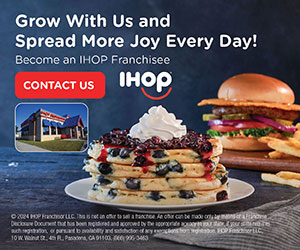Private Equity as a Development Tool
Restaurant acquisitions on the rise in 2010
Franchisors seeking to grow in a tight credit environment and slow economy are turning to private equity to counter a slowdown in financing and cash flow. For struggling systems, capital "infusions" or outright acquisition by private equity firms can replace diminished royalties and franchise fees; for successful brands, this source of additional capital can be used to accelerate growth and provide a competitive advantage.
For many reasons particular to each brand, franchisors are trading loss of control for an injection of capital and investor expertise to fund growth-oriented initiatives such as hiring new sales staff, increasing training programs, upgrading technology, launching marketing campaigns, and offering reduced franchise fees and/or initial royalties to build the system - secure in the knowledge that they have partnered with deep pockets. They can use the funds to penetrate a new market, even to acquire a local competitor.
Regardless of how the money is used, the goal generally is to apply it to building the system - and, especially for cash-strapped franchisors, it relieves the pressure to generate short-term revenue and allows management to concentrate on growing the system over time.
Partnering with private equity can be a rational choice in a tight credit environment, depending on your time horizon, growth and profitability goals, and the state of your cash flow. For some, partnering with the professional managers provided by private equity partners relieves the burden of strategic decision-making; although for others, the loss of autonomy is a deal-breaker.
A few recent examples from the news highlight what may be a growing, if not cascading, trend:
- Tropical Smoothie
On May 17, BIP Opportunities Fund (BIP) announced a $4.4 million growth capital investment in Tropical Smoothie Café, (TSC) "enabling the company to accelerate its franchise development efforts," according to BIP's press release. Tropical Smoothie intends to use the funding to buy back some franchised territories from area developers, and to invest in new technologies, personnel, and operational infrastructure to "significantly" ramp up franchise sales and support efforts. "BIP brings so much to the table -- experience, contacts, and capital in one shop," said Eric Jenrich, CEO and co-founder of TSC. "With their counsel and resources, we've clearly defined our growth strategy and are putting into place the right people and infrastructure to substantially expand the Tropical Smoothie Café brand." - Rubio's Restaurants
On May 10, Rubio's Restaurants announced an agreement under which Mill Road Capital will acquire all its outstanding shares in a cash merger transaction expected to close during the third quarter. The price was $8.70 per share, about $91 million. Rubio's opened three restaurants in the first quarter of 2010 and reported first-quarter revenues of $46.7 million, up 1 percent from the same quarter a year ago. Ralph Rubio and his father, Ray Rubio, opened the first Rubio's in San Diego in 1983. Based in nearby Carlsbad, Rubio's operates, licenses, or franchises more than 195 restaurants in California, Arizona, Colorado, Utah, and Nevada. Mill Road Capital is a Connecticut-based investment firm. - Dave & Buster's
On May 3, Dave & Buster's announced that private equity firm Oak Hill Capital Partners had agreed to acquire the brand from Wellspring Capital Management. Oak Hill is investing in partnership with Dave & Buster's current management team, led by CEO Steve King. The aggregate value of the transaction is approximately $570 million. Wellspring bought the restaurant/entertainment chain and its 46 units in 2005 for $375 million. Founded in 1982 and based in Dallas, Dave & Buster's now has 56 locations. Completion of the transaction is expected in the second quarter. - CKE Restaurants
On April 24, CKE Restaurants, parent of Carl's Jr. and Hardee's, announced the company had agreed to be acquired by Columbia Lake Acquisition Holdings (an affiliate of Apollo Management Group), for approximately $1 billion. The price was $12.55 per share, or $694 million, with the remainder of the $1 billion used to refinance CKE's debt. Two months ago, CKE announced it would be acquired for about $928 million ($11.05 per share, or $619 million, plus debt) by private equity firm Thomas H. Lee Partners, whose portfolio includes Aramark and Dunkin' Brands - but held out for a better price. Completion of the merger, which will take CKE private, is expected by the end of the second quarter of the company's fiscal 2011. - Papa Murphy's
On April 1, Charlesbank Capital Partners of Boston sold Papa Murphy's International to New York-based Lee Equity Partners. The terms of the deal were not disclosed. Papa Murphy's said the transaction will position the company for its next phase of growth, as it continues to seek new franchise owners and open locations in the U.S., primarily in the Southwest and Southeast. The deal is expected to close in the second quarter.
What does this mean for franchisors, specifically restaurants? Will there be a domino effect? Will franchisors feel compelled to seek out private equity capital as a defensive move against newly strengthened competitors? Will the huge backlog of pent-up investment capital begin to flood into franchising, creating a flurry of growth initiatives in a consumer environment still struggling to regain its footing? Will cash-rich franchisors overbuild and find themselves facing another economic downturn?
And what is the "price" of capital for franchisors, in terms of loss of control over such crucial issues as brand identity, the pace of development, and time horizons for ROI? Private equity firms are bound to repay their fund investors by a specified date. Whether that horizon is three, five, seven, or 10 years, strategic and tactical decisions will be affected.
More restaurants on the block?
So who's next? On May 18, the Motley Fool investor site (http://www.fool.com) ran a piece on the spate of restaurant acquisitions by private equity firms, predicting more ahead: "Restaurants have become popular acquisition targets, a trend that's likely to intensify in the coming months," the author wrote, continuing:
"Several factors suggest that these buyouts are simply starter courses:
- The economy appears to have bottomed out, and consumers are likely to eat out more often now, with the promise of better times ahead.
- Commercial real estate remains in a state of flux, leaving plenty of high-traffic locations available to expand concepts at fire-sale prices.
- Valuations, for the most part, remain quite reasonable for an improving industry."
He named three public restaurant companies - California Pizza Kitchen, McCormick & Schmick's, and Cheesecake Factory - as likely candidates: "These are the stocks to watch. Don't focus entirely on market darlings such as Panera Bread and Chipotle Mexican Grill, which have little reason to cash out. You need strong brands with just enough hiccups to make them vulnerable to going private, provided the premium is fair to shareholders."
For now, restaurants are the darlings - and acquisition targets - of private equity. Will other industries and sectors follow?
Share this Feature
Recommended Reading:
Comments:
comments powered by Disqus| ADVERTISE | SPONSORED CONTENT |
FRANCHISE TOPICS
- Multi-Unit Franchising
- Get Started in Franchising
- Growth
- Operations
- Open New Units
- Leadership
- Marketing
- Technology
- Legal
- Awards
- Rankings
- Trends
- Featured Franchise Stories
| ADVERTISE | SPONSORED CONTENT |






 The franchise listed above are not related to or endorsed by Franchise Update or Franchise Update Media Group. We are not engaged in, supporting, or endorsing any specific franchise, business opportunity, company or individual. No statement in this site is to be construed as a recommendation. We encourage prospective franchise buyers to perform extensive due diligence when considering a franchise opportunity.
The franchise listed above are not related to or endorsed by Franchise Update or Franchise Update Media Group. We are not engaged in, supporting, or endorsing any specific franchise, business opportunity, company or individual. No statement in this site is to be construed as a recommendation. We encourage prospective franchise buyers to perform extensive due diligence when considering a franchise opportunity.